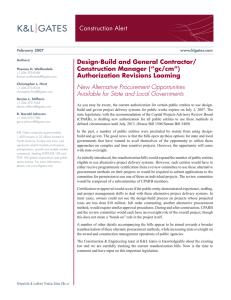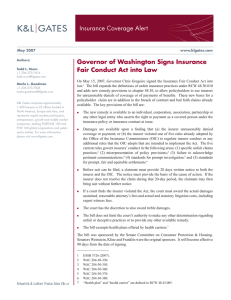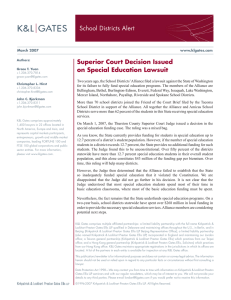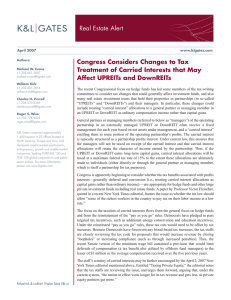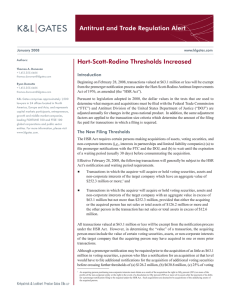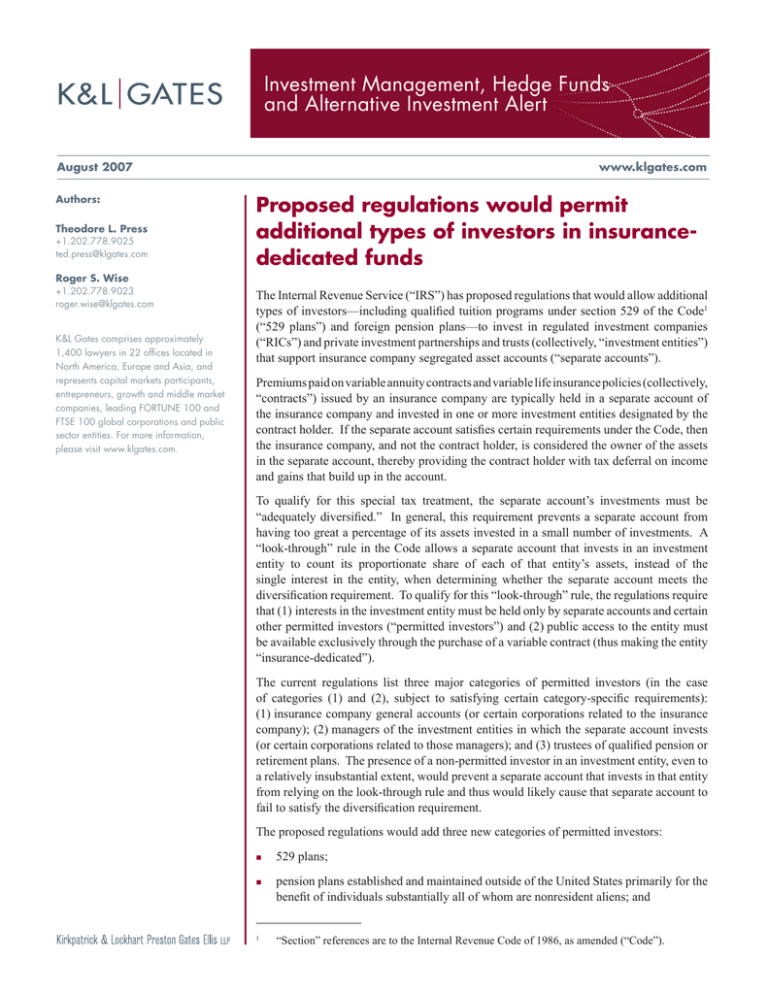
Investment Management, Hedge Funds
and Alternative Investment Alert
August 2007
Authors:
Theodore L. Press
+1.202.778.9025
ted.press@klgates.com
www.klgates.com
Proposed regulations would permit
additional types of investors in insurancededicated funds
Roger S. Wise
+1.202.778.9023
roger.wise@klgates.com
K&L Gates comprises approximately
1,400 lawyers in 22 offices located in
North America, Europe and Asia, and
represents capital markets participants,
entrepreneurs, growth and middle market
companies, leading FORTUNE 100 and
FTSE 100 global corporations and public
sector entities. For more information,
please visit www.klgates.com.
The Internal Revenue Service (“IRS”) has proposed regulations that would allow additional
types of investors—including qualified tuition programs under section 529 of the Code1
(“529 plans”) and foreign pension plans—to invest in regulated investment companies
(“RICs”) and private investment partnerships and trusts (collectively, “investment entities”)
that support insurance company segregated asset accounts (“separate accounts”).
Premiums paid on variable annuity contracts and variable life insurance policies (collectively,
“contracts”) issued by an insurance company are typically held in a separate account of
the insurance company and invested in one or more investment entities designated by the
contract holder. If the separate account satisfies certain requirements under the Code, then
the insurance company, and not the contract holder, is considered the owner of the assets
in the separate account, thereby providing the contract holder with tax deferral on income
and gains that build up in the account.
To qualify for this special tax treatment, the separate account’s investments must be
“adequately diversified.” In general, this requirement prevents a separate account from
having too great a percentage of its assets invested in a small number of investments. A
“look-through” rule in the Code allows a separate account that invests in an investment
entity to count its proportionate share of each of that entity’s assets, instead of the
single interest in the entity, when determining whether the separate account meets the
diversification requirement. To qualify for this “look-through” rule, the regulations require
that (1) interests in the investment entity must be held only by separate accounts and certain
other permitted investors (“permitted investors”) and (2) public access to the entity must
be available exclusively through the purchase of a variable contract (thus making the entity
“insurance-dedicated”).
The current regulations list three major categories of permitted investors (in the case
of categories (1) and (2), subject to satisfying certain category-specific requirements):
(1) insurance company general accounts (or certain corporations related to the insurance
company); (2) managers of the investment entities in which the separate account invests
(or certain corporations related to those managers); and (3) trustees of qualified pension or
retirement plans. The presence of a non-permitted investor in an investment entity, even to
a relatively insubstantial extent, would prevent a separate account that invests in that entity
from relying on the look-through rule and thus would likely cause that separate account to
fail to satisfy the diversification requirement.
The proposed regulations would add three new categories of permitted investors:
529 plans;
pension plans established and maintained outside of the United States primarily for the
benefit of individuals substantially all of whom are nonresident aliens; and
1
“Section” references are to the Internal Revenue Code of 1986, as amended (“Code”).
Investment Management, Hedge Funds
and Alternative Investments Alert
accounts that, pursuant to Puerto Rican law or
regulation, are segregated from the general asset
accounts of the life insurance company that owns
the account.
The addition of these categories would mean that the
look-through rule would still be available to a separate
account that invests in an investment entity with one
or more of these types of investors. This change
would also mean that 529 plans and separate accounts
could invest in the same underlying funds, which
may encourage insurance companies to become more
active in the 529 plan market.
For RICs in which separate accounts invest, the
admission of other permitted investors could create an
additional compliance burden involving the excise tax
under section 4982. In general, this section imposes
a 4% excise tax on any RIC that does not distribute at
least 98% of its income and gains to its shareholders
each calendar year. The excise tax does not apply,
however, if the only shareholders in a RIC are separate
accounts, qualified retirement plans, and, to a limited
extent, the RIC’s managers. The admission of another
type of investor, such as a 529 plan, as a shareholder
in such a RIC would mean that the excise tax would
apply thereto. Because the investors in such a RIC
(including the 529 plan) would all effectively be
exempt from tax, any additional distributions needed
to avoid the imposition of the excise tax would not
affect them and would likely be reinvested in the RIC.
The practical effect of the applicability of the excise
tax thus would primarily relate to the RIC’s need to
monitor compliance with the excise tax rules.
A separate account must also comply with investor
control rules, which prohibit contract holders from
having a direct role in selecting investments made by
the separate account and require that the investment
entities in which the separate account invests not be
available to the general public. Earlier this year, in
Revenue Ruling 2007-7, 2007-7 I.R.B. 468, the IRS
confirmed that an interest in an investment entity held
by a permitted investor is not treated as an interest
held by the general public for purposes of the investor
control rules. This ruling should apply as well to the
new categories of permitted investors in the proposed
regulations, if those regulations are finalized.
The proposed regulations also make a minor change
to give the IRS greater flexibility in assessing a
tax to remedy an inadvertent failure to satisfy the
diversification requirement.
The proposed regulations will be effective when
published in final form. Comments on the proposed
regulations may be submitted to the IRS through the
end of October, 2007.
IRS Circular 230 Notice
To ensure compliance with requirements imposed
by the IRS, we inform you that any U.S. federal tax
advice contained in this communication (including
any attachments) is not intended or written to be used,
and cannot be used, for the purpose of (1) avoiding
penalties under the Code or (2) promoting, marketing,
or recommending to another party any transaction or
matter addressed herein.
K&L Gates comprises multiple affiliated partnerships: a limited liability partnership with the full name Kirkpatrick & Lockhart Preston Gates Ellis
LLP qualified in Delaware and maintaining offices throughout the U.S., in Berlin, and in Beijing (Kirkpatrick & Lockhart Preston Gates Ellis LLP
Beijing Representative Office); a limited liability partnership (also named Kirkpatrick & Lockhart Preston Gates Ellis LLP) incorporated in England
and maintaining our London office; a Taiwan general partnership (Kirkpatrick & Lockhart Preston Gates Ellis) which practices from our Taipei
office; and a Hong Kong general partnership (Kirkpatrick & Lockhart Preston Gates Ellis, Solicitors) which practices from our Hong Kong office.
K&L Gates maintains appropriate registrations in the jurisdictions in which its offices are located. A list of the partners in each entity is available
for inspection at any K&L Gates office.
This publication/newsletter is for informational purposes and does not contain or convey legal advice. The information herein should not be used
or relied upon in regard to any particular facts or circumstances without first consulting a lawyer.
Data Protection Act 1998—We may contact you from time to time with information on Kirkpatrick & Lockhart Preston Gates Ellis LLP seminars
and with our regular newsletters, which may be of interest to you. We will not provide your details to any third parties. Please e-mail london@
klgates.com if you would prefer not to receive this information.
©1996-2007 Kirkpatrick & Lockhart Preston Gates Ellis LLP. All Rights Reserved.
August 2007 | 2

